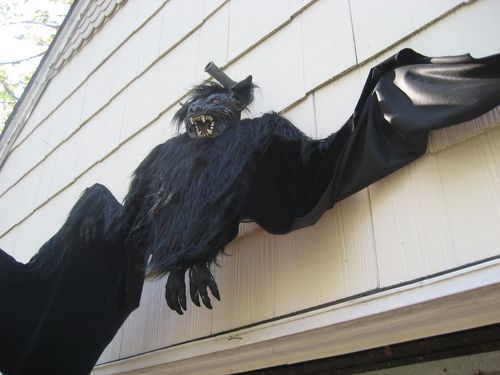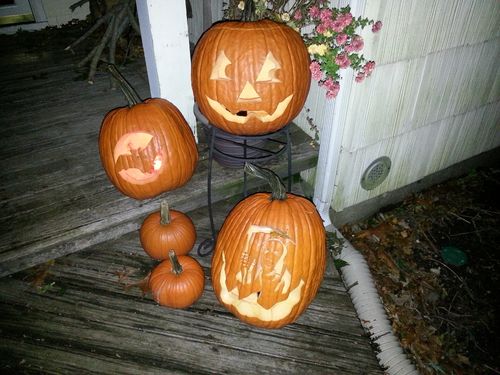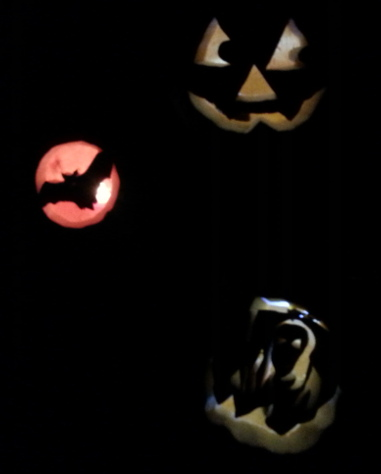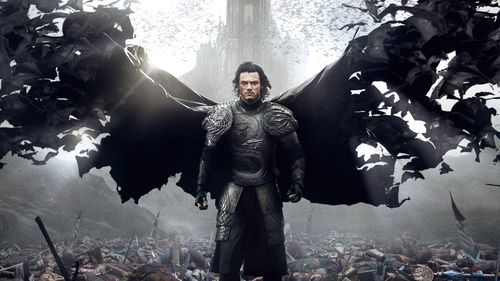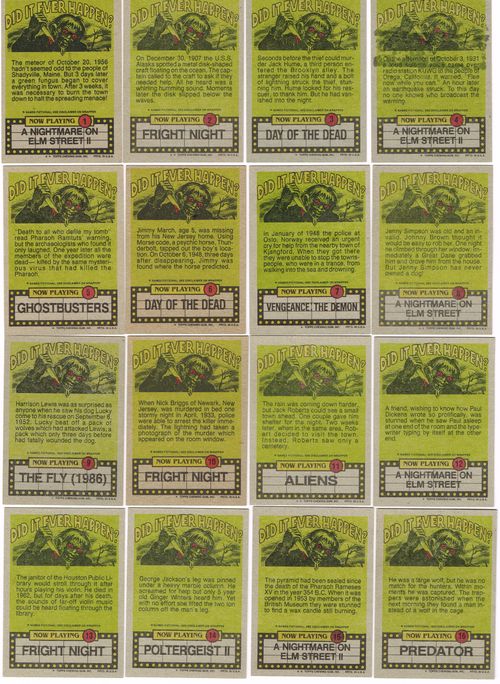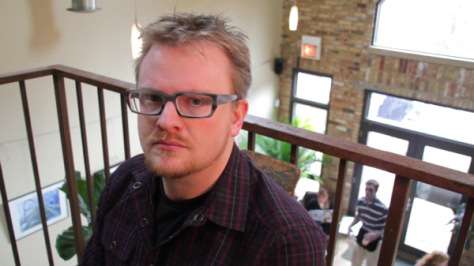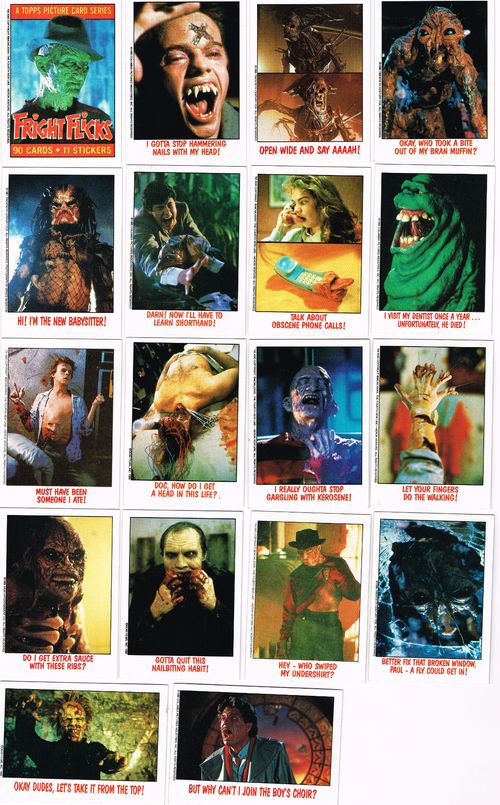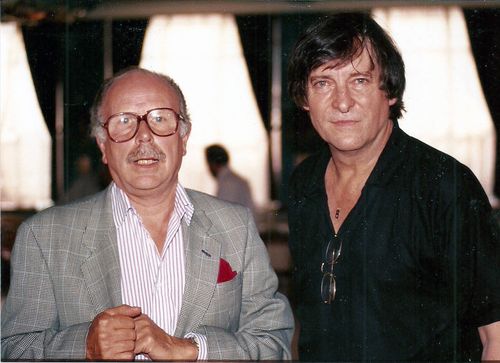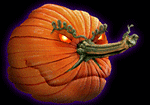From Zombos' Closet
From Zombos' Closet comes a classy and trashy collection of popular culture artifacts for those who love the terrors and treats found in movies, books, and Halloween.
« September 2014 | Main | November 2014 »
Entries from October 2014
October 30, 2014
Mexican Lobby Card:
Superman En La Selva Secreta
Posted at 03:36 PM in Azteca/Mexican Lobby Cards | Permalink | Comments (0)
October 27, 2014
My Halloween: James Chambers
 Five questions asked over a glowing Jack o'Lantern, under an Autumn moon obscured by passing clouds...in between mouthfuls of candy corn...with author James Chambers.
Five questions asked over a glowing Jack o'Lantern, under an Autumn moon obscured by passing clouds...in between mouthfuls of candy corn...with author James Chambers.
Why is Halloween important to you?
I love the creativity and mystery that come on Halloween, the celebration of imagination, the ritual of taking frightening things like skulls and bats and making something fun and exciting of them. It's the one holiday that encourages people to choose an alter ego for the day by putting on a costume, the one day we're encouraged to turn down the lights and let in the shadows. When I was young, I loved putting on a costume and trick-or-treating. As I grew, the focus of Halloween turned to spending time with friends, watching scary movies, pretending, perhaps, that spirits really did walk the earth on Halloween night. These days, I still love the scary movies, but I also enjoy the decorations, which have become much more elaborate than when I was a kid, and I enjoy the excitement in my children when they put on their costumes and head out trick-or-treating with their friends. Part of me, though, still likes to stay up past midnight with a horror movie marathon, one ear perked in hopes of hearing an eerie knock at the door or the stray whisper of something otherworldly passing in the night.
Describe your ideal Halloween.
The Halloweens I've enjoyed best have involved costume parties. My friends tried to outdo each other for creative or wild costumes. Or they came as their favorite movie monster in detailed, authentic outfits. One year, I went as Dracula, complete with cape, fangs, and fake blood capsules to bite and dribble out of my mouth. The costume parties pushed us to go out on a limb, take a risk, give each other a thrill or a laugh. For one night we created our own world where we could be someone different for as long as we stayed in costume. But it's been a long time since those parties. These days, my ideal Halloween involves non-stop horror movies playing in the background, usually a little horror writing, then taking my children trick-or-treating, and negotiating for my meager share of the candy haul when we get home.
What Halloween collectibles do you cherish, or hate, or both?
My favorite Halloween item is a giant vampire bat with a six-foot wingspan that we hang over our garage door every year. It's eyes light up, and it freaks people out. Small children avoid it. It's great! But I'm also a sucker for jack-o'-lanterns in any form. I always carve at least one very traditional jack-o'-lantern each year, just to keep the spirits away, of course. For me, that's the icon of Halloween, and I enjoy going out at night to see the glowing pumpkin faces. There's not much I hate, but I do sort of lament the proliferation of giant inflatable Halloween decorations. Some of them are pleasantly creepy, but, to me, it goes against the creative grain of Halloween to simply load up your front lawn with those things versus putting some imagination into a display. I'm a fan of clever Halloween displays. I've been lucky enough at times to live near homes where people go all out, changing everything over for Halloween, and even appearing in costume on Halloween night to give out some scares, and a few goodies as well.
When was your very first Halloween, the one where you really knew it was Halloween?
The earliest one I remember is the year I found a dead body while trick-or-treating. True story. I was about five, and I went as Superman that year. One of my friends and I trick-or-treated a house. No one answered. The inside door was open, and through the storm door, we saw a bowl of candy on a table, and a woman's feet on the floor beside it. The rest of her body stretched back into shadows. Without really understanding what it meant, I knew right away she was dead. Everything seemed so still, and the thought just clicked in my head. But our parents didn't believe us. We had to drag them up to the door and show them, and then one of them quickly shuffled us off to the next house, while someone called for help. I never found out what happened to the woman, probably a heart attack or something similar. My friend and I continued trick-or-treating. Only years later did I grasp the weight of what we'd seen. Our parents really kept it from us then. But that's always defined Halloween for me. The possibility of a close brush with the unexpected, with something dangerous. I wrote a blog post about this for the Horror Writers Association's very first Halloween Haunts blog event, which you can read for the full story: http://horror.org/the-dead-have-the-best-candy/.
What's the one Halloween question you want to be asked and what's your answer to it?
I like when people ask me for my Halloween horror movie list. I switch this up every year, but rarely do I get to all the movies I pick. This year, I'm going heavy on the classics so I can share them with my kids, and we'll be watching a couple of Universal films, The Mummy and Creature from the Black Lagoon, as well as The Uninvited, and possibly The Haunting, and finally Frankenweenie. After the kids are in bed, I'll be throwing on Trick or Treat, Return of the Living Dead, at least one John Carpenter movie (Halloween, Prince of Darkness, or The Fog), and at least one movie that I haven't yet seen still to be chosen. If I'm lucky I may get to throw in American Werewolf in London or The Resurrected.
Posted at 04:23 PM in Halloween (Memories) | Permalink | Comments (0)
October 24, 2014
Movie Herald: The Illustrated Man (1969)
Posted at 12:00 PM in Pressbooks (Horror, Sci Fi, Fantasy) | Permalink | Comments (0)
Movie Review: Dracula Untold (2014)
Zombos Says: Good (but I have reservations)
Dracula Untold is a good movie. It's just not a horror movie but more a blend of dark fantasy, historical rearrangement, and bloodless swordplay. Unlike Van Helsing, the CGI is apropos to the storyline. The story just lacks bite, you know, the usual bite we have come to expect from Dracula the vampire. Or, rather, have come to yearn for ever since Bela Lugosi and Christopher Lee portrayed the blood-thirsty count. Too often sub-textual nuances are lacking in the predominantly visually interesting rehashings or re-imaginings we've been subjected to over the decades. With Lugosi and Lee it was very simple: evil begot evil, and evil was simply that, no more, no less, and very corruptive. No explanations to soften the terror, no apologies to bring on our sympathies: Dracula embraced his blasphemy and made playthings of anyone and everyone.
But ever since Dan Curtis gave us a vampire filled with feelings and remorse, letting us feel Dark Shadows' Barnabus Collins torment with each reluctant bite of his damnation, and more specifically, Jack Palance's lost love torment as Dracula in Bram Stoker's Dracula (1973), which is now an often used background story element--all this unfortunate emotional baggage has leeched onto Dracula, the supreme vampire. Horror fans have suffered the repercussions of this softened and more romantic anti-hero ever since.
And continue to do so with director Gary Shore's Dracula Untold. The writers have penned this movie as a franchise-building first chapter in the super hero vein, so Vlad Dracula (who historically is Vlad the Impaler, Prince of Wallachia), who spiked thousands of innocent and not so innocent people for kicks and giggles, is now just a family man trying to keep his kingdom from being overrun by the Turks. He doesn't just become a vampire, he becomes a super vampire with a heart of tarnished gold to defend his people. While Penny Dreadful on Showtime shows more promise for those horror fans who remember Dracula as a true evil, unexplained and unapologetic, Universal Studios new Dracula is offering his services as chief character in their new franchise mythos. He's handsome, urbane, and keeps his fangs to himself as best he can. I wonder what the studio, the one that wrought the classic horror monster movie cycle in the first place, has in store for the Frankenstein Monster, the Mummy, the Wolf Man, and the Creature from the Black Lagoon now that they're to be joined at the hips like the characters in the Marvel and DC Universes?
For those who remember the all in one (or as many as the budget allowed) Monster Rallies, where the Frankenstein Monster, the Wolf Man, and Dracula prowled together in House of Frankenstein (1944) and House of Dracula (1945), Universal's approach seems like a more serious attempt at a meta-rally than the one used in The Monster Squad (1987). In that movie Dracula gathered the Monsters together in his quest to rule the world. But Dracula doesn't want to rule the world in Dracula Untold. He doesn't want to be evil, either. This tends to take a bite out of his more sanguine appeal and threat potential. To be fair, even though he may be a reluctant vampire, his intentions for good do get twisted into malevolence no matter what he does.
A beautiful, gothically-colored flourish has him change into a small colony of bats for quick trips and bedeviling enemies. A clever embellishment using point of view imagery mirrored on a sword blade, and a darkened palette throughout, makes Dracula Untold a beautifully rendered movie. But Dracula here is a pawn in a larger game, one being played by HIS master, the vampire that turned him, and this, by its structural implication, waters down the horror we should be seeing--and feeling--from the Prince of Darkness himself. Instead, the Master Vampire, the one who turned him, has all the plans and machinations for ill-intent. Go figure. All this time I thought Dracula was the master vampire.
Do you recall this line Lugosi speaks in Dracula (1931)? To die, to be really dead, that must be glorious.He says this to Mina during the opera's intermission. So much is implied in this odd utterance. Is Dracula yearning for true death? Is Dracula mocking those who CAN die? He follows this with his more ominous There are far worse things awaiting man than death. Is he referring to his fate or to the fate he brings? So much to ponder in two sentences. So little to ponder in Dracula Untold. There are no notable quotes, no outstanding performances, no suspense delivered from Dracula's potential terror.
In essence it's the streamlined actioner we've come to expect from cinematic franchises. Simple plot, lots of action, and an ending that doesn't quite end as it builds a bridge to the next movie in the series. Let the monster rally commence.
Posted at 08:48 AM in Universal Monsters | Permalink | Comments (0)
October 22, 2014
Topps Fright Flicks Trading Cards: Backs
As I noted before, the "Did it ever happen?" backs don't relate to the scenes on the front of the cards. Instead you have little odd stories posing that question. You decide.
Continue reading "Topps Fright Flicks Trading Cards: Backs" »
Posted at 09:28 AM in Trading Cards | Permalink | Comments (0)
My Halloween: Scott Kenemore
Five questions asked over a glowing Jack o'Lantern, under an Autumn moon obscured by passing clouds...in between mouthfuls of candy corn...with author Scott Kenemore.
Why is Halloween important to you?
Scott: I've been a horror fan since I was nine or ten, and I've always had a soft spot for Halloween. The word "important" is interesting. I'd say Halloween is important to me because it creates a kind of carnival atmosphere where people feel free to explore and engage with concepts and ideas that they might not usually entertain. You can use it to try out new costumes, yes, but also new personalities and ways of interacting with the world (if only for a night). I can't think of too many holidays with that component.
Describe your ideal Halloween.
Scott: I would be 10 years old again, enjoying the Headless Horseman Hayride at Conner Prairie in Indianapolis, and then jaunting off to a Halloween storytelling festival, probably followed by trick or treating. An ideal contemporary Halloween would be spent with interesting people who really give a damn about horror. And probably cocktails.
What Halloween collectibles do you cherish, or hate, or both?
Scott: I can't be the only reader of this blog who encounters this, but--being a "horror person"--the distinction between Halloween collectibles and horror collectibles feels more and more blurred all the time. That said, it is probably my Collector's Edition of Return of the Living Dead. This is one of my favorite horror films of all time, and has definitely been an important part of many good Halloweens.
When was your very first Halloween, the one where you really knew it was Halloween?
Scott: Zounds! This is hard. I have memories of picking pumpkins at a very PG-rated Halloween festival when we lived in upstate New York in the Binghamton/Endicott/Johnson City area when I was a little kid. I don't know if I had entirely wrapped my brain around the entire reason for the season, but I definitely was beginning to understand that something was "up." And that it was awesome.
What's the one Halloween question you want to be asked and what's your answer to it?
Scott: Ha! Maybe: "What's your favorite scary story to read on Halloween?" Lately, my answer has been The Last Feast of Harlequin by Ligotti. It is about the idea of dressing up for festivals, and is very, very scary to boot.
Scott Kenemore's latest novel is The Grand Hotel.
And yes, the place is haunted by strange things that go bump in the night (or slither their tentacles in the night). Perfect for your October reading to prime you for a gloriously spooky Halloween. Stay tuned for my review, which will be invoked before the candy corn runs out.
Posted at 08:00 AM in Halloween (Memories) | Permalink | Comments (0)
October 21, 2014
Topps Fright Flicks Trading Cards: Fronts
Warning, the images can be gory! Which shouldn't bother most horror fans ;)
This Topps Fright Flicks card set from the 1980s is a nostalgic tour of great horror moments from a wonderful decade for horror movies. And you got a stick of bubble gum and a sticker in every wax pack too! Can't beat that.
Here are the 90 card fronts. I didn't place them in numerical order, but kept the horizontal cards separate from the vertical ones. I'll have the card backs posted shortly. Unfortunately, each card back notes the movie the facing photo is from, but for some odd reason adds a little blurb of text that's not related to the movie or the photo. (As always, click each image to view its larger counterpart. To view the card backs, go here.)
Continue reading "Topps Fright Flicks Trading Cards: Fronts" »
Posted at 01:55 PM in Trading Cards | Permalink | Comments (0)
Professor Kinema's Interviews
with Jeremy Brett and Edward Hardwicke
Edward Hardwicke and Jeremy Brett (photo by Jim Knusch)
Encounter with Sherlock Holmes and Doctor Watson
by Jim Knusch
In August of 1991 my girlfriend and travel companion, and I, were traveling abroad. Our itinerary for this particular trip was first a week in and around London, then on to a few other European locales. As a favor to some friends who were publishing a magazine named Scarlet Street, I agreed to get a few interviews. First up--the very afternoon of the day we arrived in London--were Jeremy Brett and Edward Hardwicke, Sherlock Holmes and Doctor Watson themselves.
Jeremy Brett started life as Peter Jeremy William Huggins. Because his father thought acting was a dubious profession he forbade him from using the family name on stage. So Jeremy took his stage name from the label of his first suit, 'Brett & Co.' On the screen he appeared with Audrey Hepburn in two major big budget films: as her brother Nikolai Rostov in War and Peace (1956), and later as her suitor Freddy Eynsford-Hill in My Fair Lady (1964).
Edward Hardwicke was from a totally different realm. He was born into a showbiz family, being the son of famed actor Sir Cedric Hardwicke. His first screen appearance was in 1943 in an unbilled appearance as a British Boy in A Guy Named Joe. At the time they were teamed as Holmes and Watson, Brett was just one year younger than Hardwicke.
With a portable cassette player, a notebook, and a 35mm camera in hand, I made my way to the Great Western Synagogue in London, where rehearsals for The Master Blackmailer were beginning. This wasn't 221B Baker Street (an actual address in London), but a certain thrill and magic for me were there just the same. My password for entry was Granada TV. I was brought into the room where the principal cast and director, Peter Hammond, were all seated at a table reading through the script. My host, who allowed me in, kindly told me to have a seat, pour a cup of tea, and be comfortable.
By this time, Granada TV had produced the series The Adventures of Sherlock Holmes which ran for 13 episodes (1984-85), The Return of Sherlock Holmes (1986-88), and two Sherlock Holmes TV movies: The Sign of Four (1987) and The Hound of the Baskervilles (1988). In between, Sherlock Holmes was turning up as part of the PBS Masterpiece Mystery (1987-88) in the USA. At the time of my interviews, the series was again in production by Granada as The Casebook of Sherlock Holmes (1991-93). The Master Blackmailer, based on the short story The Adventure of Charles Augustus Milverton, was to be a special two-hour episode. Being about the seventh of nine entries of the current series it was scheduled to air in England in January 1992.
Mixed into all of this was a theatrical adaptation, The Secret of Sherlock Holmes, by Jeremy Brett's friend, playwright Jeremy Paul. The production ran at Wyndham's Theatre in London's West End with Brett (as Holmes) and Edward Hardwicke (as Doctor Watson) during 1988 and 1989. The production subsequently toured. Research shows that it never made it to Broadway. If it did come to the USA, it must have had a limited touring schedule in select cities. Interestingly, Brett had previously played Doctor Watson on stage opposite Charlton Heston as Holmes in the 1980 Los Angeles production of The Crucifer of Blood, making him one of only four actors to play both Holmes and Watson professionally.
Since I had only occasionally caught an episode here and there of this now truly classic TV series, my friends at Scarlet Street magazine shipped VHS copies of all of the Sherlock Holmes shows they had available to the Kinema Archives. In the days before we planed off I managed to binge-watch them all (overdosing on them in the process) and jotted down many notes.
In the all-purpose room of the Great Western Synagogue the read-through was finished. I remember Mr. Brett saying something like, "Well, I guess that's it for today, except for our friend over here (pointing to me). Edward Hardwicke requested to be interviewed first, saying that he was dashing off to the theater. I managed to take a few photos, although, unfortunately, none with me posing with them. Eventually all departed, leaving me and Jeremy alone to have a nice, casual, interview and engage in light conversation.
My interview with Jeremy Brett
Has your approach to playing Sherlock Holmes changed over the years?
Brett: Yes, lots, insofar as I had to learn how to play him. Not that I've learned yet. But when I first started I was incredibly nervous about getting it wrong and I've relaxed a little bit.
You've been playing Sherlock Holmes for nine years now.
Brett: I started in '83 and I think I've learned a few things. Not many, but a few.
I presume you were aware of the stories and had formed an image in your mind of Sherlock Holmes?
Brett: Well I was very fortunate, because it was offered in '82 and then was cancelled. I went off to Canada to play Prospero in The Tempest and when I finished that, I had the Canon. So I had plenty of time to read. I'd read it when I was at school at university, but not as a part to play. So by the time Granada got back to me again, I was ready. I'm still aiming at the same thing, which is to get it right. It's much better read than to be actually seen.
Have you a favorite episode from the series?
Brett: I think the beginning of The Dancing Men, when I asked my director if I could actually lift it from the printed page. We realized we actually could do Doyle, undiluted. In that case, even unadapted. And that was exciting. Dangerous, but exciting. We were very low on confidence when we started, particularly me. Nobody really wanted to do it because everyone said it's been done. It was only after the first year and a half when we started to sell, I think, to 35 countries, that we began to take heart.
So this one particular episode struck a chord?
Brett: I began to think, my gosh, I might be able to play this part. The production standards, thanks to Granada Studios, have always been very, very high. And I've had two brilliant Watsons, which has been wonderful for me.
How would you compare David Burke and Edward Hardwicke as your two Watsons?
Brett: Well, they've very beautifully dovetailed each other. Quite remarkably, some people in Japan and now Russia have written saying how brilliant it was, the aging of Watson between The Final Problem and The Empty House. So, fortunately, thanks to the enormous tact of both of them - and David Burke's wife, who suggested Edward to take over, I've been very, very fortunate. You must remember the whole project was created by Michael Cox at Granada, to put posterity straight in regard to Watson. Thanks to those two marvelous actors, David Burke and Edward Hardwicke, It's been done.
Did your playing of Sherlock Holmes alter with the change in Watsons?
Brett: Oh yes, very much.
You're one of the few actors to play both Holmes and Watson. What was your approach to the character of the Doctor?
Brett: Well, I was fortunate being the son of a soldier. I have some military blood in my veins, I suppose. I played him with enormous enthusiasm and devotion to Holmes. With enormous respect although I got quite angry and upset--very upset--when Holmes abused himself. I would kill for him. That's how I played Watson.
Are there any predecessors in either role that you particularly admire?
Brett: I suppose my favorite one is James Mason; he's my favorite Watson. I guess my favorite Holmes will be Basil Rathbone forever. He seems to me to be the Paget drawings on the move--not having seen William Gillette, of course (laughs).
Have you ever seen Ellie Norwood as Holmes?
Brett: No, I haven't. I did start to see a few films before we started shooting, and I actually stopped because I got so overwhelmed and fearful. I thought, I really shouldn't be playing this part at all. So I stopped.
What was the most difficult episode to film?
Brett: Probably The Blue Carbuncle. That Sidney Pagent drawing is so marvelous, with Holmes lying sideways on the sofa. I had to actually be in that position for about a day and a half, so I could very nearly not stand up straight at the end of shooting the scene.
So it was physically, not mentally taxing?
Brett: It was an undiluted piece of brilliant deduction. And one so invariably gets it wrong. I remember thinking that was a particularly tough film.
Why did you decide to come back to Holmes with The Master Blackmailer, which is based on The Adventure of Charles Augustus Milverton?
Brett: Oh I rang up about March and said I was prepared to finish the Canon as long as they gave me gaps and took care of me.
I heard you were going to do three more.
Brett: No, we're finishing the Canon.
The entire Canon?
Brett: Last March I girded my loins and asked Granada what they'd say if I was willing to do it. They said you are our most successful series, you have our blessing. So I rang a very important person named Edward Hardwicke--we're joined at the hip--and asked if he'd come with me and the answer was yes. So we decided to go for the gold.
That's wonderful, but some of the short stories don't seem to lend themselves to screen adaptation.
Brett: They need a little help, yes, but we're getting better at that. We're kind of doing it in the Doylean way. For instance, The Adventure of Charles Augustus Milverton is one of his shortest stories. We've just completed a two-hour movie, and I think Dame Jean Conan Doyle read it and she's thrilled. I think we can do it if we're careful, but it's going to need a little work.
As a matter of fact, I read it too. In a roundabout way I did see a copy sent by Jeremy Paul.
Brett: You did? Were you pleased?
Very Pleased. It was wonderful.
Brett: What about Holmes being kissed when he becomes engaged to Milverton's maid, Agnes?
I think it all works beautifully.
Brett: Well I mean she kisses me. I don't do anything (laughs).
You've stated that you want the episodes to stay as faithful to the stories as possible.
Brett: That's true.
How is it possible with The Master Blackmailer, which was, as you said, a short story and has been given a two-hour format?
Brett: Blackmail seems to take that long. Luckily, Jeremy Paul, who did the play The Secret of Sherlock Holmes for me, which I commissioned in 1987, has done a fine job. The book is there, but it comes at the end.
Is there a possibility that you might be bringing the play to the USA?
Brett: Yes, in '94.
Any remarks about your other co-stars? Rosalie Williams and, on occasion, Colin Jeavons?
Brett: Well, my Lastrade, my darling Colin who's with me in this, and my darling Rosalie who's with me in The Master Blackmailer--I mean we've become family over the years. Every time Rosalie or Colin are in it I rejoice.
Have you been disappointed in any particular episode?
Brett: No. I haven't been too particularly thrilled, either. I think that maybe when you seek perfection you can't do anything else but fail. I feel I like little bits and pieces of me: 10 minutes, maybe, out of 32 hours. I'm not very good at looking at myself. I like it when I'm not speaking. What I can't believe is when I'm speaking. Sometimes when I'm doing physical things, I think, well, that's not bad. But I never feel like Holmes when I speak. I do when I'm doing it, but not when I see it.
George Bernard Holmes based Henry Higgins on Sherlock Holmes. Have you any desire to play Higgins?
Brett: No. I've just been offered Higgins.
Really? Perhaps there's a connection between them.
Brett: No, They're just two isolated men. I don't think there's any connection, really.
What are your immediate plans?
Brett: To complete this, have a gap, and then we'll see. I think they're preparing three already, for next year. And a further three, later, and we'll see how far we can go.
Thank you so much.
My interview with Edward Hardwicke
You come from an acting family. Were you encouraged to become an actor or discouraged?
Hardwicke: Well, they were very neutral about it. In think they were quite pleased, in a way. When I started it wasn't like today, when it's become such a fashion for acting families to continue. That certainly wasn't the case when I started.
Your father, Sir Cedric Hardwicke, once played Sherlock Holmes on radio, didn't he?
Hardwicke: Yes he did. I didn't even know that until a couple of years ago. Somebody sent me a tape of the vintage show that they somehow managed to get. I don't know how they got it, but I didn't realize that he had done that.
Was it difficult to step into David Burke's shows as Watson?
Hardwicke: In my mind it was difficult. It was made very easy by Granada and particularly by Jeremy and the team, the regular team of people who were putting the program on. They couldn't have been more helpful. Of course, there is a sort of physical image of these two characters. You think of Holmes in the black coat and Watson tends to have the bowler hat and the mustache, so in a sense you had all the guidelines, which helped.
What episode did you film first?
Hardwicke: The Abbey Grange, which was directed by Peter Hammond, who's doing The Master Blackmailer. That was the first one I did with them.
Do you see your Watson as being different from those of your predecessors?
Hardwicke: Well, inevitably it's different, because you're dealing with different actors. I think when you're dealing in film, you have to play very close to yourself. I don't mean to say that I'm remotely like Watson; I couldn't be a doctor to save my life (laughs).
That's a funny way of putting it. Not many people think of Dr. Watson as a professional man.
Hardwicke: Well, I do; that's a very important part of him. Being a detective is very much like being a doctor. Somebody comes to you in pain and asks what's wrong with me and you have to tell them. I think there's a huge similarity, and this analytical side of Holmes' detection appeals to Watson.
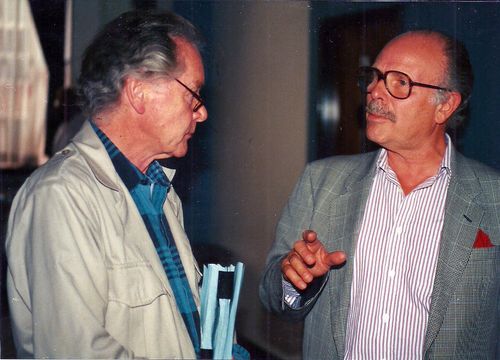 Roger Hammond (Jabez Wilson) and Edward Hardwicke
Roger Hammond (Jabez Wilson) and Edward Hardwicke
(photo by Jim Knusch)
Do you find yourself mimicking any previous Watsons?
Hardwicke: Not at all, no. I remember once in the National Theatre with Lawrence Olivier, when I took over a part in a play, Olivier's advice was "Pinch any bit of business that you like. I always have done that." And I think that's part of the theater tradition. The tradition of English acting is based on other actors, rather than people; I think it's a kind of house style, if you like.
Have you a favorite episode?
Hardwicke: No. There are two ways of looking at anything you do on film. The actual circumstances in which you film it, that is to say the cast and whether you get on with them, whether you have friends, and the conditions in which the film is made, the actual stories. If you read the stories I suppose one inevitably goes to the famous ones, which I was not involved in, like The Speckled Band. Of the ones we've done one is colored by the circumstances in which they were filmed. I've enjoyed a lot of them hugely. I mean there've been a number of great friends who've played parts, and that's given it a kind of enjoyment which is very special.
Is there an episode that didn't come off quite as you wanted it to?
Hardwicke: Well I think it would be impossible to say that any of them came off quite as I wanted them. That's difficult, again. I'm not dodging the question, but you have personal disappointments in things that you feel you would have liked to achieve in a particular episode. This is always true of acting; it's one of the penalties of seeing things on film. I always avoid going to rushes. Jeremy likes to do it, but I think that every actor has a different way of approaching these things. I don't go because I find that I'm always disappointed; I think I've done something and something quite different appears, but it may be the difference that's the interesting thing that you do. To go back to the question, yes, there are lots of moments when I felt that I haven't done what was in my head to do, and that's always a disappointment.
What's your opinion of The Hound of the Baskervilles, in which you had more screen time than Jeremy Brett?
Hardwicke: Well, that's the nature of the story, the way Doyle wrote it. The great thing is that Holmes lurks menacingly, if you like, to put it that way, throughout the whole story. Although you don't see him, one has the suspicion that he's around, which of course he is.
What's your overall opinion of The Hound?
Hardwicke: I think that's a great story. I suppose if one had to be pinned to a wall, that's the story most people associate with Sherlock Holmes. It's a terrific story, very difficult to put on film; I don't think we succeeded entirely with that one, but then I don't think you can. You're up against people's imaginations. You're dealing with a book, and people read it and every person who reads it has his own idea, so you're competing with millions of different versions of the same thing. You can't hope to please everybody.
Did you play Watson differently on stage in The Secret of Sherlock Holmes than you play him on film?
Hardwicke: Not consciously. I think you work the material you're provided with, really. The play was an interesting idea, and dealt very much with the relationship between the two men, and what happened when Holmes disappeared and the effect it had on Watson. And to that extent you play that. You pick up a script, you read it. You see how you can make that work.
In television, a weak performance can be made to look better through editing, and vice versa.
Hardwicke: Oh sure, sure.
And a powerful performance can be diluted by the way it's presented on the screen.
Hardwicke: Yes, that's absolutely right. You are, in the theater, your own master. Nobody is pulling the strings.
If Jeremy Brett is willing to continue with the series, are you?
Hardwicke: Well, at the moment, I don't know what will happen. We're doing this particular one. We thought--this was sort of a surprise, and a delightful one--we thought we'd finished. And then they decided to do this two hour special, which we are enjoying enormously. Beyond that, I really don't know.
I heard they're preparing at least three more.
Hardwicke: They've got to settle the question of television licenses and such.
One of the nice things about the series is the rapport that Watson has with Inspector Lestrade, particularly in The Empty House and The Six Napoleons. Did you work this out with Colin Jeavons or was it part of the script?
Hardwicke: Well it's very nice that you should have picked that up. It never occurred to me. I think that, if it's there, it was in the script, and we must have just found that and that's what happened. I think that probably is the case; certainly, in The Empty House, I remember we had quite a few scenes. In the end it's a question of whether you have scenes together: a relationship will develop of some sort.
What, besides The Secret of Sherlock Holmes have you been doing in the theater lately?
Hardwicke: I've done a little directing over the last couple of years, which I've enjoyed hugely. I would love to go back to do something on the theater, some farce or some comic stuff, which is my particular favorite. Beyond doing The Master Blackmailer I have no particular plans of any sort.
Thank you immensely. It's been a pleasure.
Ultimately another season of Sherlock Holmes Adventures was produced by Granada called The Memoirs of Sherlock Holmes (1994). The final episode featuring Jeremy Brett and Edward Hardwicke was The Cardboard Box.
Jeremy Brett wound up his 40 year career appearing in two films: Mad Dogs and Englishmen (1995) and Moll Flanders (1996). He passed away at age 61 in 1995 of iatrogenic congestive cardiac failure. Edward Hardwicke appeared as Sir Arthur Conan Doyle in a film released in 1997 titled Photographing Fairies. He appeared in one episode of Agatha Christie's Poirot television series as Sir Henry Angkatell titled The Hollow (2004). He wound up his almost 70 year career with a film appearance as Mr. Brownlow in Roman Polanski's Oliver Twist (2005). He passed away at age 71 in 2011 from cancer.
Posted at 10:40 AM in Kinema Archives | Permalink | Comments (0)
October 17, 2014
Halloween Animated Medusa Head
From Lowe's Stores
Posted at 02:58 PM in Halloween Novelty | Permalink | Comments (0)
Halloween Animated Dracula
With Coffin Buddy
Posted at 02:50 PM in Halloween Novelty | Permalink | Comments (0)
Halloween Zombie Pocket Screamers
Posted at 12:36 PM in Halloween Novelty | Permalink | Comments (0)
Subscribe to Weekly Email for New Posts!
Go To...
Read My Book on Kindle
I Like to Talk
Categories
- Art/Animation (32)
- Authors (28)
- Azteca/Mexican Lobby Cards (779)
- Bloggers (48)
- Books (Bad) (2)
- Books (Fiction) (51)
- Books (Graphic) (33)
- Books (Non-fiction) (31)
- Comics/Manga (85)
- Convention/Event Programs (8)
- Death (13)
- Documentaries (11)
- Freaks/Geeks (5)
- Gift Ideas (12)
- Halloween (Memories) (54)
- Halloween Candy (36)
- Halloween Costume (70)
- Halloween Light-Ups (16)
- Halloween Novelty (91)
- Halloween Paper (63)
- Haunt Attractions (8)
- Horror Hosts (29)
- Kinema Archives (51)
- LOTT D (66)
- Magazine Morgue (261)
- Model Kits/Figures (10)
- Monster Laffs (10)
- Movies (Bad) (49)
- Movies (Drive-in) (31)
- Movies (Ghostly) (19)
- Movies (Gore) (9)
- Movies (Horror) (90)
- Movies (Indie) (33)
- Movies (Non-horror) (9)
- Movies (Slasher) (12)
- Music/Radio (13)
- Pictures (102)
- Pressbooks (Horror, Sci Fi, Fantasy) (666)
- Pressbooks (Non-Horror) (198)
- Reflections (58)
- Short Stories (2)
- Superheroes (9)
- Toys/Games (23)
- Trading Cards (16)
- TV/PC (28)
- Universal Monsters (21)
- Vintage Days (26)
- Wild West Weird (6)
- Zoc's Desk (9)
Significant Others
Other Others
Copyright Notice

From Zombos' Closet by John Michael Cozzoli is licensed under a Creative Commons Attribution-NonCommercial-NoDerivatives 4.0 International License.
Based on a work at http://www.zomboscloset.com.- Copyright© 2006-2023
From Zombos' Closet's fictional characters and personal blog posts are created and copyrighted by JM Cozzoli. Additional content is copyrighted by the respective contributors and owners of that content. From Zombos' Closet is a non-commercial site for the enjoyment of fans of the fantastique, the horrifying, the trashy, and the sublime.

